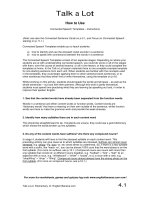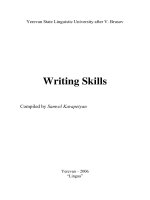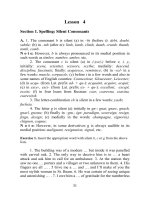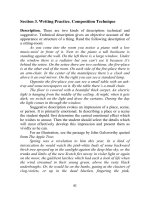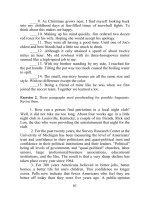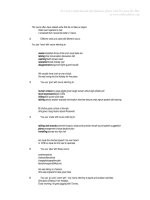Tài liệu Developing writting skills 1 part 6 pdf
Bạn đang xem bản rút gọn của tài liệu. Xem và tải ngay bản đầy đủ của tài liệu tại đây (131.94 KB, 10 trang )
(b) Join the following pairs of sentences using so … that, such … that
where necessary.
1. He was glad to see me. He asked me to stay the night. 2. He
was tired. He could not get up in the morning. 3. I have many friends
abroad. I cannot write to all of them. 4. He is a good driver. I am
surprised to hear he has had an accident. 5. He is an interesting
person. It is a pleasure to hear him talk. 6. It is a good film. it would
be a pity to miss it. 7. She was very angry. She refused to see him. 8.
It is a beautiful evening. We should go for a walk. 9. He is a shy
person. He dislikes talking to strangers. 10. We arrived early. We
had to wait for over an hour.
(c) Join the following parts of sentences using the conjunctions given
in brackets, omitting the phrase it doesn’t matter if / how.
1. I wrote to him several times. I received no answer.
(although) 2. He plays well. He is still not good enough for the
football team. (in spite of the fact that) 3. We are determined to get
there. It does not matter how far away it is. (however) 4. The journey
takes too long. It does not matter if you go by plane. (even if) 5. I’m
sure he won’t come. It does not matter how long you wait. (however)
6. We are going on an excursion. The weather is bad. (in spite of the
fact that) 7. He speaks French well. He has never been to France.
(even though) 8. She was very busy. She was able to help me.
(although) 9. I should not work for him if I were you. It does not
matter if he offers you a big salary. (even if) 10. I still think the film
is poor. It does not matter if so many people enjoyed it. (even
though)
Exercise 2. Combine each group of sentences to form one complex
sentence. You may make any necessary changes in the arrangement of
material and in the wording, but must not change the sense of the original.
(Skeleton structures have been suggested to indicate possible approaches to
the syntax, but they are not obligatory.)
1. I returned to the city. I had been born there. I had been
absent for many years. Many of its narrow streets had been
51
demolished. So had their picturesque houses. They had made way for
shopping thoroughfares. These were modern but undistinguished. I
was dismayed to find this. (When … I was dismayed to … .) 2. The
bubonic plague raged in Europe during the Middle Ages. The name
given to it was “The Black Death”. It carried off thousands of the
population. In some cases, it exterminated whole towns and villages.
(“The Black Death” … , carrying … and … exterminating … .)
Exercise 3. Combine each group of sentences so as to form not more than
two complex sentences. You may make any necessary changes in the
arrangement of material and in the wording, but must not change the sense
of the original.
1. Sir Christopher Wren (1632 – 1723) had already attained
distinction as an astronomer. He was only sixteen then. Nevertheless,
later, he seriously took up the study of architecture. This was not till
he was nearly thirty. The most precious fruit of this study was St
Paul’s Cathedral. 2. Queens’ college was the second royal foundation
at Cambridge. King’s College was the first. The former is
distinguished from the college of the same name at Oxford in a
certain respect. It owes its foundation to two Queens. One was
Margaret. She was the wife of Edward the Fourth. This is why the
apostrophe comes after the s. 3. The Pilgrim Fathers were a group of
English Puritans. They first spent some years in exile in Holland.
They did this to escape religious persecution. They later sailed to
America in the Mayflower. They established a colony at Plymouth in
Massachusetts.
Exercise 4. Explain what is wrong with the following sentences. Suggest a
more logical version if possible. If the ideas are not logically connected, say
so.
1. One of them was red-faced, another was young and lean. 2.
The art dealer got two thousand dollars for the portrait, so he paid the
painter his twenty-five dollars and ordered him to do another picture,
a landscape. 3. Her father was overwhelmed with financial worries,
he was a painter. 4. He was a heavy man, and I could hardly help
him. But he still wanted to ride to T. It was impossible for him. He
52
could not mount the horse. 5. The family got poorer and poorer, and
now Bella lived alone in a very big house. 6. Although he was a rich
man, he was lame from birth.
Section 3. Writing Practice. Composition Technique
Character Sketch. The character sketch like the description of a
place is designed to evoke an impression (of excitement, enthusiasm,
fury, admiration, etc.), to express an attitude, to produce an
essentially emotional effect. In the character sketch the effect is
likely to be somewhat more complex, because it is concerned with
human personality
The writer of a character sketch analyses the traits of the
character and depicts them as vividly and concretely as he can. He
does not merely inform the reader about them, but appeals to the
reader’s senses and emotions.
The reader should come to feel that he knows the person who
is the subject of the sketch. If he does have this feeling, the character
sketch is successful. For illustration, here is a passage from literature.
Note the linguistic devices the author uses to achieve such a
marvellous effect describing an old man.
An old man in a brown bowler walked slowly along the path.
His narrow trousers, in a pale brown whipcord, were cut in the style
of the nineties. The sleeves of his long waisted coat were so tight that
one wondered how his great yellow hands could pass through them.
He was like an old grasshopper, left over from last year to shuffle
when it could not leap. He reached a bench, stared at it a long
moment, tapped it with his stick as if to require something of it. Then
he turned himself carefully round; bringing into the spring sunlight,
pale as a primrose, his dull face, hollow-cheeked and dry; the great
orbits of his sunk eyes, the long nose fallen at the tip; his white
moustache, of thin separate hairs like glass threads. This face
expressed resolution and some alarm. A string of muscle jerked in
the shadow of the cheekbone. Suddenly he swung forward from the
hips, placed both hands upon the knob of his stick, and broke at the
knees. His look of alarm became intense, his long flat feet jerked
upwards, he collapsed upon the seat as if his body had telescoped
53
into itself, like a picnic breaker. But in a moment it began to rise
again; the clothes to fill. The old man straightened his back, raised
his chin; until, upright at last, he pulled down his waistcoat, settled
his hat, and looked about him. He had now the air of success.
(By Joice Cary)
Exercise 1.
Conversations Overheard
Place yourself where you'd likely find groups of people. It
could be in a restaurant, a grocery aisle, bank line, beauty parlor or
anywhere else you can think of. You are the narrator, relaying the
conversation (s) you overhear to the reader. You will be telling the
stories of the people you overhear. The dialogue you overhear will
have basic content, but it is your job to relay the subtexts--underlying
meaning--to the reader. The conversation you overhear can be
gossip, or revealing a secret, or the simple differences between the
characters you overhear. It's up to you where you take it, what your
characters talk about, what they look like and how your narrator
interprets it. It's not as hard as it sounds. Think of the conversations
you've eavesdropped on while waiting in the check out line or at the
next table in the restaurant. Now create a scene. Have fun with this!
Exercise 2. Write a story of about 100-120 words, using the pairs of
sentences given below. (You have been given the first and last sentences of
your paragraph and should supply those, which come between.) Find a
suitable title for your story.
“But I haven’t got any money,” I said to the waiter. … … …
I spent half the night washing dishes.
54
Lesson 6
Section 1. Spelling
A. Suffixes -en and -ness.
(a)
-en is a Germanic suffix met in
verbs; added to adjectives and sometimes to nouns to form verbs
(transitive and intransitive).
M o d e l: mad + en = madden (to make mad); red + en =
redden (to make red, or to become red).
(b) -ness is a Germanic suffix used to form abstract nouns from
adjectives.
Exercise 1. Form verbs from the words given below by adding the suffix -
en and fill in the blanks. Translate the sentences.
(deep, hard, height, sick, sharp (2), dark, haste, deaf, length, quiet,
tight)
1. Bill got out a long-bladed pocket-knife and … it on a stone.
2. The lines of his face … and into his eyes came a fighting look. 3.
Roy put his hand on her arm quickly to … her. 4. It is terrible. It …
me to think of it. 5. The fair was in full swing. The noise was … . 6.
This plan he was now … to put into execution. 7. The spring came
and with it a hundred new delights; Peggy watched the … days. 8.
He … the belt around his slim waist. 9. Her copy of Science and
Health and her Quarterly were on a table beside her bed in the …
room. 10. Now every impression was … , every part of me singularly
aware: eyesight, hearing, sense of smell, all had been in some way …
. 11. The word was uttered in a hasty whisper that seemed to … the
ensuing silence.
Exercise 2. Form nouns from the adjectives given below by adding the
suffix -ness and fill in the blanks. Translate the sentences.
(rude, happy, ready, bold, kind, dark, mad, sleepless, ugly, weak)
1. He was not polite. But this time I didn’t mind his … . 2. Her
eyes were tawny and bold; and in their … lay a curious innocence. 3.
It was a shapeless red-brick house, but we did not think twice about
its … , since there was room to be together. 4. Suddenly he smiled at
55
